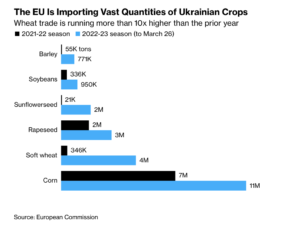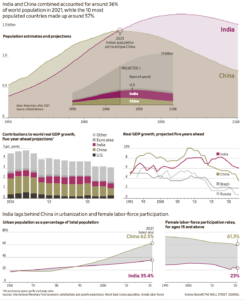As a result of the attack on Iran, nitrogen fertilizer at the port of New Orleans has seen an increase in price this week. Urea prices for barges in New…
EU: Poland, Hungary Bans on Ukrainian Farm Imports, “Unacceptable,” as “India’s Population Surpasses China’s”
Raphael Minder, Barbara Erling, Andy Bounds and Marton Dunai reported yesterday at The Financial Times Online that, “Poland and Hungary have temporarily halted imports of Ukrainian grain despite a warning from Brussels that such unilateral action would contravene EU trade policy.
“After Moscow launched its full-scale invasion of Ukraine last year, the EU scrapped customs duties and quotas on Ukrainian grain imports and rerouted some shipments from blockaded Black Sea ports via Polish and Romanian roads and railway networks.
The announcement by Poland and Hungary is an attempt to placate their farmers amid a grain glut that has sent prices crashing in their domestic markets as cheap Ukrainian grain undercuts local producers.
The FT writers explained that, “Most of the grain was meant to be re-exported from the EU to the Middle East and Africa to help Ukraine’s economy and at the same time alleviate food shortages sparked by the war.
“But the grain remained in countries close to Ukraine because of a shortage of trucks and trains to move it to neighbouring ports. A bumper grain harvest in central Europe meanwhile helped to avert a food crisis.”
Matthew Mpoke Bigg, Vivek Shankar and Enjoli Liston reported in today’s New York Times that, “The European Union has criticized bans by Poland and Hungary on imports of Ukrainian grain and other foods over the weekend, saying the unilateral moves were ‘unacceptable.'”
Today’s article noted that, “A spokesperson for the European Commission, the European Union’s executive arm, said in an email on Sunday that such a trade policy was a matter of ‘E.U. exclusive competence,’ meaning that only the bloc could adopt legally binding decisions. ‘Unilateral actions are not acceptable,’ the statement said.
“The announcements from Hungary and Poland come as Russia has expressed doubts about extending the Black Sea grain deal, which the United Nations and Turkey brokered last year and was scheduled to expire in the next few weeks.”
“Ukraine’s agriculture minister, Mykola Solskyi, said on Saturday that Kyiv understood that its agricultural exports represented ‘tough competition‘ for other countries, but added, ‘The Ukrainian farmer is in the most difficult situation.’ Mr. Solskyi was expected to travel to Poland on Monday to continue talks on the issue,” the Times article said.

Bloomberg writers Veronika Gulyas and Piotr Bujnicki reported yesterday that, “In a letter to European Commission President Ursula von der Leyen this month, Bulgaria and four EU states adjacent to Ukraine pushed for the bloc to increase financial support to farmers, consider buying the surplus grain for humanitarian aid or even restrict imports from Ukraine. ”
W związku z pojawiającymi się pytaniami, zakaz ma charakter pełny, łącznie z zakazem tranzytu przez PL.
— Waldemar Buda (@waldemar_buda) April 16, 2023
Kwestia tranzytu będzie przedmiotem dyskusji ze stroną UA na temat zbudowania szczelnego systemu i gwarancji wyłącznie przejazdu produktów przez PL. https://t.co/jfPs9CFmvd
Wall Street Journal writer Thomas Grove reported yesterday that, “Poland has remained one of Ukraine’s staunchest supporters since the conflict began in February 2022, but the move by Warsaw, which comes ahead of a parliamentary election later this year, is meant to appease the country’s powerful agricultural lobby. The ban also flies in the face of Brussels, which has jurisdiction over all EU trade policy.”
Reuters writer Gabriela Baczynska reported today that, “European Union member countries’ envoys in Brussels will discuss this week a move by Poland and Hungary to ban grain and other food imports from Ukraine, a senior EU official said on Monday.”
And Reuters writer Naveen Thukral reported today that, “Chicago wheat prices lost ground on Monday with the market giving up some of last session’s gains on pressure from plentiful global supplies and continued Black Sea shipments despite Russia’s threats on the wartime export deal.”

In other news, Shan Li and Liyan Qi reported on the front page of Saturday’s Wall Street Journal that, “China’s population has reigned as the largest in the world for more than two centuries. Now India is taking its place, heralding a major shift in the global order.”
“China’s demographic headwinds will make it harder for the country to achieve its economic ambitions, or to supplant the U.S. as the world’s biggest economy, despite its rising wealth and military power,” the Journal article said.





